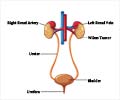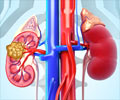Researchers have found that the nonsurgical image-guided treatment of kidney tumors – cryoablation – is as effective as the laparoscopic technique in viable candidates. The research was presented at the Society of Interventional Radiology’s 32nd Annual Scientific Meeting.
The comparative trial shows that percutaneous cryoablation results in a slightly lower recurrence rate of the tumor, a shorter hospital stay, no major complications, and a 59.5 percent lower hospital cost than the laparoscopic treatment. During cryoablation argon gas enters the tip of the probe and extracts heat from the surrounding cells, resulting in an “ice ball” that freezes and kills the tumor. The nonsurgical treatment spares the majority of the healthy kidney tissue and can be repeated as often as needed. This interventional treatment had no major complications as opposed to the surgical group, which experienced complications in six percent of those studied.The radiologist uses imaging to pinpoint the tumor, and then inserts the cryoprobe through the skin, similar to the way a biopsy is performed. This can be performed under general anesthesia, but is often possible with only local anesthesia and conscious sedation. By using imaging the radiologist can avoid going through any adjacent structures or harming healthy tissue. If necessary, adjacent structures can be displaced prior to the ablation to minimize collateral damage. Laparoscopy, on the other hand, requires general anesthesia, as well as multiple abdominal incisions to allow access for the surgical instruments. It is also associated with a longer recovery time.
“This early stage research indicates that percutaneous cryoablation in the appropriate patient population can effectively kill tumors, while also offering patients a shorter hospital stay, a faster recovery, and an excellent safety profile, all at a lower cost than laparoscopy,” noted study author J. Louis Hinshaw, M.D., of the University of Wisconsin. “Unfortunately, not all patients are viable candidates for percutaneous ablation and we work closely with our urology colleagues to ensure that each patient receives the most appropriate treatment.”
The FDA has approved both radiofrequency ablation and cryoablation for use in soft tissue tumors, of which renal cell carcinoma is one.
“We are excited about this study because it offers patients with renal cell carcinoma a less traumatic treatment that can be repeated as needed,” Hinshaw added. “Depending on the stage of the disease, this procedure can be curative, but can also be used for palliative treatment in some settings.”
Source-Newswise
SRM











